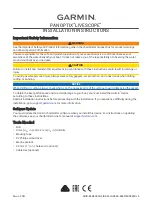
Operation Manual
FarSounder, Inc.
F31552 (Rev. 3.8.0)
Page 65 of 69
D. Maintenance
1. Overview
Your FarSounder sonar system has been designed with minimum maintenance requirements. However,
like any shipboard system, it is important to periodically check the status of the system. This section of the
manual outlines the recommended maintenance procedures and schedule for FarSounder's sonar systems.
2. Every 3 Months
Inspect the Transducer Module(s) for marine growth. Depending on the local marine environment and the
amount of time the vessel is underway, the array face of the Transducer Module may become biologically
fouled. This fouling is a build up of marine life such as barnacles and algae growing on the urethane array.
Fouling will dampen the power of the transmit signal and reduce the sensitivity of the received echoes. If
fouling is present, it can be scraped off with a simple paint scraper or the handle of a wooden paintbrush.
When cleaning the Transducer Module's array face, it is important that the urethane is not damaged.
Inspect the Transducer Module(s) for corrosion. A properly installed Transducer Module will be connected
electrically to the vessel's ground and local zincs. In these cases, there should be no corrosion even
after extended periods of in-water deployment. If corrosion of the metal is detected, it is important that
the Transducer Module's connection to local zincs are confirmed and if necessary, add additional local
zincs to the Transducer Module's mounting bolts. Unchecked corrosion will eventually lead to failure of the
Transducer Module's pressure case and non-warranty damage to the unit.
3. Every 6 Months
Inspect and clean the fans on the processing computer(s) and Power Module(s). A build up of dust and
debris will reduce the effectiveness of these components. Replace any fans as needed.





















